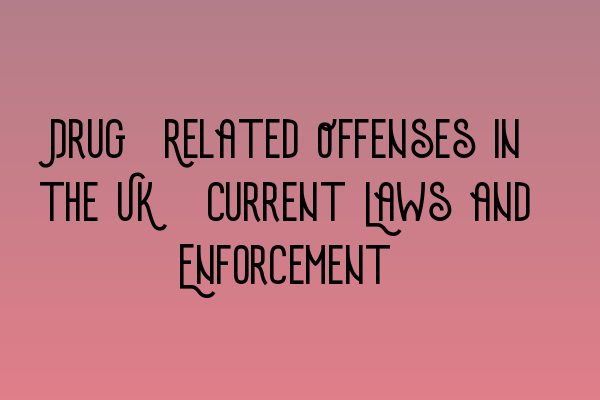Drug-Related Offenses in the UK: Current Laws and Enforcement
Welcome to SQE Criminal Law & Practice Law UK, your trusted source for comprehensive legal information. In this blog post, we will delve into the topic of drug-related offenses in the UK, discussing the current laws and enforcement surrounding them. We understand the significance of staying up to date with the ever-changing legal landscape, especially when it comes to crimes related to drugs. So, let’s jump right in!
The Legal Framework
Drug-related offenses in the UK are primarily governed by the Misuse of Drugs Act 1971. This legislation classifies drugs into three categories: Class A, Class B, and Class C. Each category carries different penalties, depending on the severity of the offense. Our SQE 1 Practice Exam Questions article can provide you with further insights into the legal aspects of drug offenses.
Class A drugs, including heroin, cocaine, and ecstasy, are considered the most dangerous and attract the harshest penalties. Possession, supply, and production of these substances can result in lengthy prison sentences and hefty fines. On the other hand, Class C drugs, such as cannabis, carry relatively milder penalties.
Enforcement and Sentencing
Law enforcement agencies, such as the police and the National Crime Agency, play a crucial role in combating drug-related offenses. Their primary objective is to detect, apprehend, and bring offenders to justice. Initiatives like the Drug Strategy aim to reduce drug misuse, drive enforcement, and support individuals in recovering from addiction.
The penalties for drug offenses vary depending on the circumstances and the offender’s level of involvement. A person found in possession of a controlled substance for personal use may face a lesser penalty compared to someone involved in supply or production. In severe cases, especially those involving large-scale drug trafficking, sentences can extend up to life imprisonment.
It is important to note that drug offenses are heavily scrutinized by the legal system, and the Crown Prosecution Service (CPS) plays a vital role in deciding whether a case should proceed to court. The CPS considers various factors, such as the strength of evidence and the public interest, before making this determination.
Seeking Legal Assistance
If you find yourself involved in a drug-related offense, it is crucial to seek legal advice as soon as possible. Our SQE 1 Practice Mocks FLK1 FLK2 article can provide you with practice materials to enhance your legal knowledge. A skilled criminal defense solicitor specializing in drug offenses can assess your case, guide you through the legal process, and provide effective representation in court.
At SQE Criminal Law & Practice Law UK, we offer comprehensive SQE 2 Preparation Courses to aspiring solicitors, equipping them with the necessary skills to handle complex issues, including drug-related offenses. Our SQE 1 Preparation Courses can also provide a solid foundation in criminal law, ensuring you have a strong understanding of the subject matter.
Conclusion
Drug-related offenses in the UK carry serious consequences, and understanding the current laws and enforcement surrounding them is vital. By familiarizing yourself with the Misuse of Drugs Act 1971 and seeking legal advice when needed, you can navigate the legal system with greater confidence. Remember, the criminal justice system recognizes the importance of fair and just proceedings, giving you an opportunity to present your case effectively.
For more information on the legal aspects of drug offenses and other related topics, feel free to explore our website. Stay updated with the latest SRA SQE Exam Dates and be sure to seek professional guidance for your legal needs. Knowledge is power, and we are here to empower you on your legal journey.
